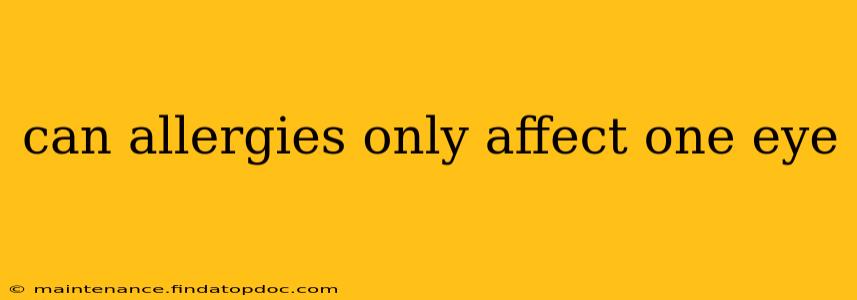Yes, it's possible for allergies to affect only one eye. While allergies often impact both eyes symmetrically, causing itchy, watery eyes, redness, and swelling, unilateral allergic conjunctivitis (affecting only one eye) isn't uncommon. This isn't necessarily a cause for alarm, but understanding the reasons behind it is crucial.
Why Would an Allergy Only Affect One Eye?
Several factors can explain why an allergic reaction might be localized to a single eye:
-
Asymmetrical Exposure: The most straightforward explanation is unequal exposure to allergens. Perhaps you only rubbed your right eye after touching a pet or a plant, or a gust of wind blew pollen primarily into one eye. This uneven exposure can trigger a localized allergic reaction.
-
Individual Variations in Immune Response: Our immune systems are complex and vary significantly from person to person. One eye might have a heightened sensitivity to a particular allergen due to subtle differences in its immune cell population or the presence of specific receptors.
-
Underlying Eye Conditions: Pre-existing eye conditions, even minor ones, can influence the way the eye responds to allergens. A pre-existing irritation or infection in one eye could make it more susceptible to an allergic reaction.
-
Contact Lens Use: If you wear contact lenses, an allergy might disproportionately affect the eye with the lens in place, especially if the lens itself is a source of irritation or if it traps allergens against the eye's surface.
-
Environmental Factors: While less common, environmental factors such as a localized source of allergen (like a plant near one window) can influence the occurrence of unilateral allergic conjunctivitis.
How to Tell if It's an Allergy or Something Else?
Differentiating between an allergy affecting only one eye and other eye conditions is important. Symptoms of allergic conjunctivitis typically include:
- Itching: Intense itching is a hallmark symptom of allergic conjunctivitis.
- Watery Eyes: Excessive tearing is common.
- Redness: The eye's conjunctiva (the membrane lining the eyelid and eye) may appear red and inflamed.
- Swelling: The eyelids may swell.
However, other conditions can mimic these symptoms. If your symptoms are severe, persistent, or accompanied by other issues such as blurry vision, pain, or light sensitivity, consult an ophthalmologist or optometrist immediately. They can help diagnose the underlying cause and recommend appropriate treatment.
What if Only One Eye is Affected? Should I See a Doctor?
While a unilateral allergic reaction is often benign, it's advisable to consult a doctor if:
- Symptoms are severe or worsen: Intense pain, blurred vision, or significant swelling warrants immediate medical attention.
- Symptoms persist for an extended period: If the symptoms don't improve with over-the-counter allergy relief within a reasonable timeframe, seeking professional help is recommended.
- You have other concerning symptoms: Any additional symptoms, such as fever, headache, or unusual discharge, should prompt a doctor's visit.
How is Unilateral Allergic Conjunctivitis Treated?
Treatment for unilateral allergic conjunctivitis is similar to that of bilateral allergic conjunctivitis. Your doctor might recommend:
- Over-the-counter antihistamine eye drops: These help alleviate itching and redness.
- Prescription eye drops: For more severe cases, a stronger medication might be necessary.
- Cold compresses: Applying cold compresses can help reduce swelling.
- Identifying and Avoiding Allergens: Identifying and minimizing exposure to the specific allergen is crucial for long-term relief.
In conclusion, while allergies usually affect both eyes, it's perfectly plausible for an allergy to affect only one. While often a mild issue, understanding the potential causes and knowing when to seek professional help is crucial for effective management and prevention. Remember, this information is for general knowledge and shouldn't replace professional medical advice. Always consult a healthcare provider for diagnosis and treatment of any eye condition.
